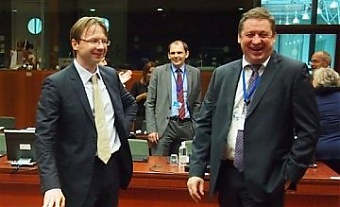Baltic States – CIS, Economics, Energy, EU – Baltic States, Legislation, Lithuania
International Internet Magazine. Baltic States news & analytics
Saturday, 20.04.2024, 00:54
EU's policy framework for climate and energy discussed in Brussels
 Print version
Print version |
|---|
| Photo: urm.lt |
At the meeting, member states discussed the preparation for the 23-24 October European Council. The Council will focus on climate, energy and economic growth.
"The European Council's discussions on climate change and the EU's active role in the preparation for the 2015 Paris Climate Conference agreement, which is to be legally binding, are very important, but it is equally important that the EU takes timely decisions on the EU's energy security," said Krisciunas.
In Lithuania's opinion, the EU's policy framework for climate and energy for 2020-2030 should be based on comprehensive impact assessment. The goals set should be based on fair burden-sharing between member states, provide flexibility, so that each member state would be able to achieve goals in the most effective way.
When discussing the forthcoming European Council's agenda, Lithuania suggested that EU leaders should discuss in detail the situation in Ukraine. This is especially important in the run-up to the Ukrainian parliamentary election to the Verkhovna Rada to be held on 26 October 2014.
When debating the strategy for growth and jobs, Deputy Minister Krisciunas stressed the need to take immediate action to implement the most important EU initiatives, which would have a positive effect on the prospects for economic growth and competitiveness.
"We can't put off to tomorrow what needs to be done today. We need to take immediate concrete actions to effectively implement key initiatives - completing the internal market when it comes to energy, services, and digital," said the deputy minister.
The Council also adopted the EU strategy for the Adriatic and Ionian region. The strategy covers Croatia, Greece, Italy, and Slovenia, and four non-EU countries: Albania, Bosnia and Herzegovina, Montenegro and Serbia. It aims to strengthen cooperation in fisheries and shipping, transport and energy networks, environmental protection and sustainable tourism.
The Council formally adopted the decision to delay until 1 January 2016 the provisional application of the free-trade agreement with Ukraine. When adopting the decision, the Council, the Commission and the High Representative for Foreign Affairs and Security Policy made a statement, noting that the EU-Ukraine free trade and Association Agreement was a bilateral agreement, which could be changed only by mutual consent from both parties. This statement also called on Ukraine to continue reforms and to modernise the economy.








 «The Baltic Course» Is Sold and Stays in Business!
«The Baltic Course» Is Sold and Stays in Business!

